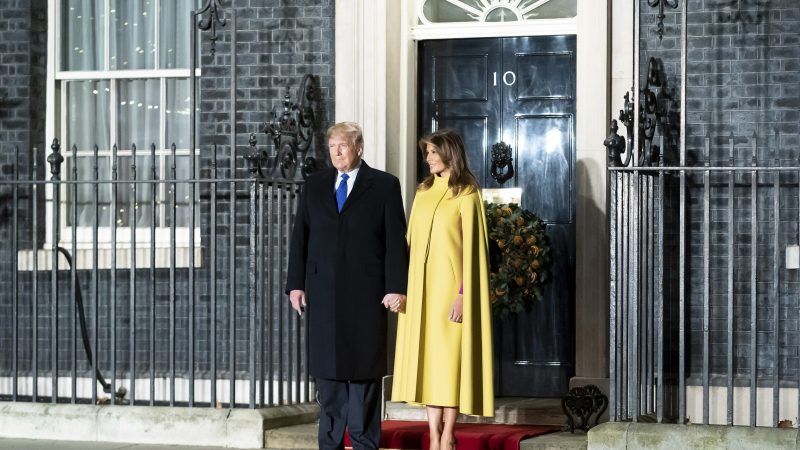Republicans Are Learning to Love Unconstrained Executive Power
Just like their counterparts in the Democratic Party do!

Do Republicans and Democrats have any respect for what makes America the country it is? When it comes to the country's political foundations, it doesn't look that way.
Some countries are defined by culture, others by ethnicity, and still others by language. The United States is defined by a shared, if imperfectly implemented and frayed, political tradition of limited government and personal freedom. It's a little worrying, then, when supporters of the major political parties show disdain for the constitutional constraints that supposedly embody that political tradition.
"The share of Republicans who say presidents could operate more effectively if they did not have to worry so much about Congress and the courts increased 16 percentage points over the past year, from 27% in March 2018 to 43% this past July," Pew Research Center noted this week.
Not coincidentally, the current president is Donald Trump, who was elected as a Republican. Skepticism about congressional and judicial restraints on presidential power are strongest among conservatives who make up the core of Trump's support. In the poll, 52 percent of conservative Republicans agree that "many of the country's problems could be dealt with more effectively if U.S. presidents didn't have to worry so much about Congress or the courts." By contrast, 68 percent of liberal to moderate Republicans say it would be "too risky" to give presidents more power, essentially unchanged from last year.
Unsurprisingly, with their party out of the White House, Democrats are less enamored of loosening checks on the presidency. Eighty-four percent of liberal Democrats oppose the idea, as do 81 percent of moderate to conservative Democrats, according to Pew.
But this is where donkey party fans should temper the smirks. It turns out that many Democrats' resistance to presidential power is situational; they only oppose such power when they don't control it.
"The share of Democrats saying it would be too risky to expand presidential power increased by more than 20 percentage points (from 66% in 2016 to 87% in 2017)," Pew reports in the same poll.
In 2016, Barack Obama, a Democrat, was president, to be succeeded by Trump the next year. Support for expanding unconstrained presidential power sharply declined among Democrats right after they lost control of the White House.
That squares with what other researchers have found.
"Respondents who provided higher approval ratings of the president were significantly more supportive of presidential powers," wrote Andrew Reeves and John C. Rogowski, then two political scientists at Washington University. Published in the December 2015 issue of Presidential Studies Quarterly, their paper found significant similarities between Republican and Democratic views of presidential power in the abstract; basically, a majority of partisans of both parties thought the presidency should not be able to act unilaterally.
But—and it's a big but—those numbers shift dramatically when people considered powers being exercised by a specific president they really like.
The researchers "evaluated whether the public president should be able to exercise unilateral control of the military, keep certain information concealed from Congress and the public, veto legislation passed by Congress, appoint judges of his choice without Senate consent, direct agency implementation of policies passed by Congress, and create new policies through unilateral action without having Congress vote on them."
"Across each of the six measures, respondents who provided higher approval ratings of the president were significantly more supportive of presidential powers."
The ability of presidents to harness support to stretch the boundaries of authority might explain why the power of the presidency keeps growing, Reeves and Rogowski suggested.
While numbers for both groups shifted along with control of the White House, Republicans in 2019 seem to support unconstrained presidential authority to a somewhat greater extent than did the Democrats polled by Pew in 2016. That might suggest a greater degree of authoritarianism among fans of the current president than among supporters of the last one.
More likely, though, is that we're watching the continuing erosion of the tradition of limited government.
The "cult of the presidency" (as Gene Healy called it in his 2008 book by that name) wields "an increasingly expansive set of presidential powers," in the words of Reeves and Rogowski. It does so at the behest of partisans cheering on their champion when they're in power and is only ineffectively and temporarily opposed by those who hope to hold the presidency again.
Opposition to presidential power, and adherence to constitutional constraints, have become entirely instrumental, to be supported by those out of power and abandoned once office is recaptured.
That's why Democrats can criticize President Trump's use of executive orders at a pace exceeding that set by President Obama, only to promise to do the same when they hold the presidency. They even laugh off the idea of restraints on the power of a future non-Trump president.
And that's why Republicans are such fans of Trump unbound after spending years railing against the excesses of his predecessor.
Republicans and Democrats may despise and attack each other with ever-nastier vitriol, but they agree on one thing: Many partisans of both the legacy parties reject America's tradition of limited government and a president of defined and constrained power when it limits them. A large share of each faction wants a maximum leader—so long as it's somebody from their team who gets to crack the whip.


Show Comments (81)